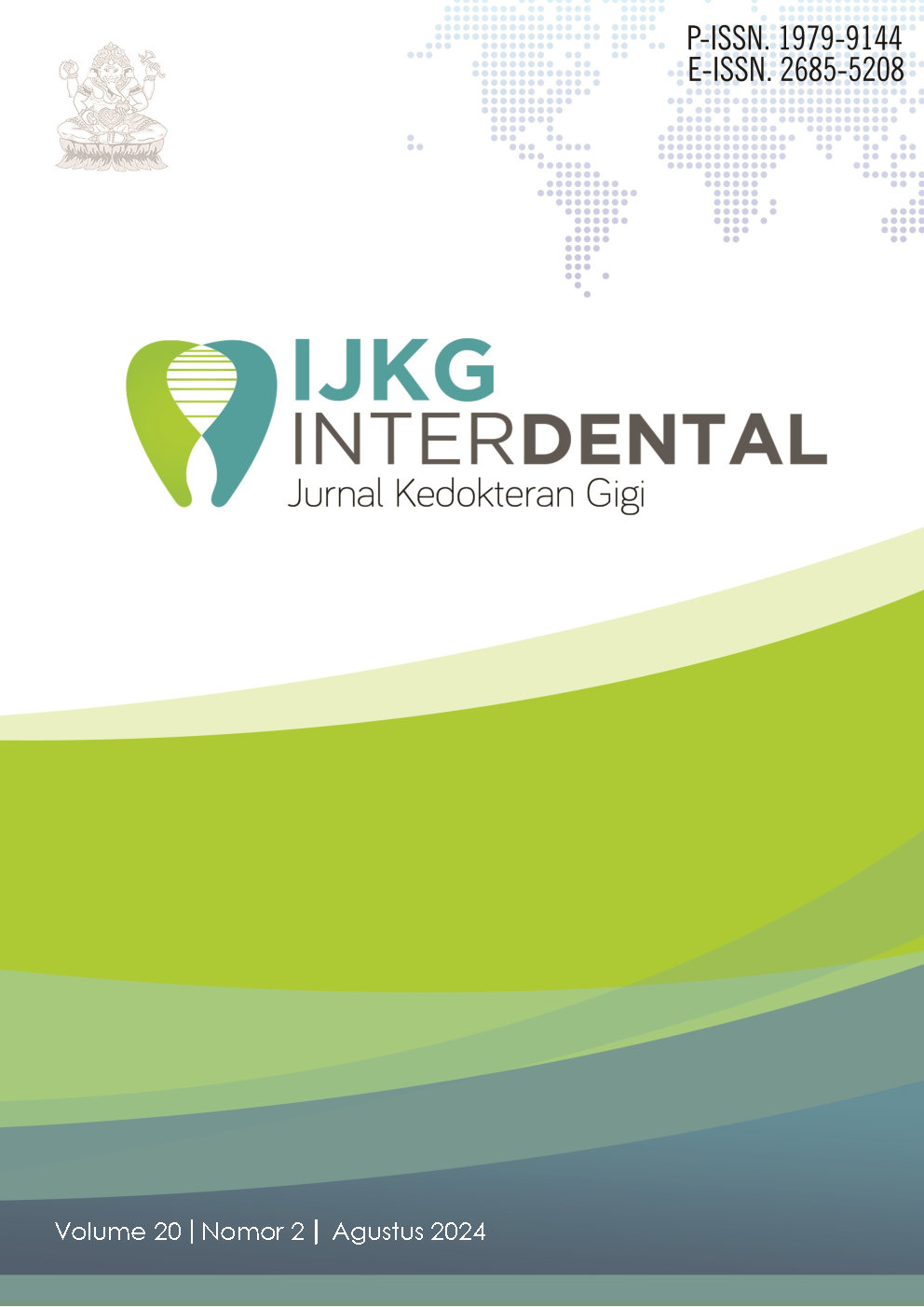Bioactivity of Kemangi (Ocimum sanctum L.) Flower Infusa Against Candida albicans In Vitro
DOI:
https://doi.org/10.46862/interdental.v20i2.8852Keywords:
Acrylic resin plate, green betel leaves, basil leaves, candida albicansAbstract
Introduction: The surface of acrylic resin denture, which attaches to the oral mucosa, has microporosity, a place for bacterial plaque and Candida albicans to accumulate if not cleaned properly. An increase in Candida albicans colonies on the surface of dentures can cause denture stomatitis. Dentures can be cleaned mechanically with a soft-bristled brush, or chemically using cleaning agents. Denture cleaning materials on the market are sold in limited quantities at expensive prices. Natural ingredients can be alternative denture cleaning agents. This study aims to determine the difference in the bioactivity of basil and green betel leaf infusion on the growth of Candida albicans in vitro.
Materials and Methods: This research is a laboratory experimental study using a post test only control group design method, divided into 4 groups, group 1 as a negative control using aquadest, group 2 as a positive control using polident denture cleanser, group 3 using 50% green betel leaf infusa, and group 4 using 50% basil leaf infusa. Each group consisted of 6 acrylic resin plates as a medium for Candida albicans attachment. Differences in the mean number of colonies in the groups were analyzed using Mann-Whitney test.
Results and Discussions: Statistical analysis showed that there was a significant difference in the mean number of colonies between all groups regarding the growth of Candida albicans colonies with a p-value of 0.001 (p < 0.05).
Conclusion: The results showed that basil leaf infusion had lower bioactivity potential than green betel leaf infusion against Candida albicans in vitro.
Downloads
References
Sari SP, Gunadi A, Kristiana D. Efektivitas perasan daun kemangi (Ocimum basilicum) dibanding larutan pembersih gigi tiruan effervescent sebagai pembersih gigi tiruan resin akrilik terhadap pertumbuhan Candida albicans. Pustaka Kesehatan 2019;7(2):135–41. Doi: https://doi.org/10.19184/pk.v7i2.19127
Philips R. Buku Ajar Ilmu Kedokteran Gigi. 10th ed. Jakarta: EGC; 2003.
Kusmawati FN, Putri TF. Pengaruh rebusan daun sirih terhadap penurunan jumlah Candida Albicans pada plat resin akrilik heat cured. Jurnal Ilmiah dan Teknologi Kedokteran Gigi 2019;15(1):12–5. Doi: https://doi.org/10.32509/jitekgi.v15i1.783
Aoun G, Cassia A. Evaluation of Denture-related Factors Predisposing to Denture Stomatitis in a Lebanese Population. Materia Socio Medica. 2016;28(5):392. Doi: 10.5455/msm.2016.28.392-396
Abualsaud R, Aleraky DM, Akhtar S, Khan SQ, Gad MM. Antifungal activity of denture base resin containing nanozirconia: In vitro assessment of candida albicans biofilm. The Scientific World Journal 2021;2021(5556413):1-8. Doi: https://doi.org/10.1155/2021/5556413
Santhi K. Perbandingan efektivitas infusa daun sirih (Piper betle L.) dan kemangi (Ocimum sanctum L.) terhadap pertumbuhan koloni Candida albicans pada plat resin akrilil heat cured. Skripsi. Denpasar: Universitas Mahasaraswati Denpasar; 2023 [cited 2024 Apr 9]. Available from: http://eprints.unmas.ac.id/id/eprint/2429/
Hamid A, Deynilisa S, Nurhayati M, Listrianah. Pelatihan pembuatan larutan lidah buaya sebagai antiseptik gigi tiruan. ABDIKEMAS: Jurnal Pengabdian Kepada Masyarakat 2021;3:88–92. Doi: https://doi.org/10.36086/j.abdikemas.v3i1.640
Dyah Parmasari W. Analisa aktivitas antibakteri rebusan daun sirih dengan rebusan daun kemangi terhadap pertumbuhan bakteri Streptococcus mutans. Hang Tuah Medical Journal [Internet]. 2020 [cited 2024 Apr 8];18(1):38–48. Available from: https://journal-medical.hangtuah.ac.id/index.php/jurnal/article/view/109
Amanah A, Lazuardi N, Hermawan I. Perbandingan efektivitas minyak atsiri daun sirih hijau (Piper betle Linn) dengan minyak atsiri rimpang temulawak (Curcuma xanthorrhiza) terhadap Candida. Tunas Medika Jurnal Kedokteran & Kesehatan [Internet]. 2018 [cited 2024 Apr 9];4(2). Available from: https://jurnal.ugj.ac.id/index.php/tumed/article/view/1713
Rahmah N, Rahman AKN. Uji fungistatik ekstrak daun sirih (Piper betle L.) terhadap Candida albicans. Bioscientiae 2018;7(2):17–24. Doi: https://doi.org/10.20527/b.v7i2.180
Marisa E, Eha D, Haryy P. Efektivitas perendaman akrilik heat cured dalam infusa daun kemangi (Ocimum basilicum Linn) terhadap Candida albicans. Journal of Prosthodontics [Internet]. 2010 [cited 2024 Apr 10];1(1):13–22. Available from: https://scholar.google.com/scholar?hl=en&as_sdt=0%2C5&q=efektivitas+perendaman+akrilik+marisa&btnG=
Yanti N,Samingan, Mudatsir. Uji aktivitas antifungi ekstrak etanol gal manjakani (Quercus infectoria) terhadap Candida albicans. Jurnal Ilmiah Mahasiswa Pendidikan Biologi [Internet]. 2016;1(1):1–9. Available from: https://jim.usk.ac.id/pendidikan-biologi/article/view/361
Komang A, Ornay D, Prehananto H, Sekar A, Dewi S. Daya hambat pertumbuhan Candida albicans dan daya bunuh Candida albicans ekstrak daun kemangi (Ocimum sanctum L.). Jurnal Wiyata: Penelitian Sains dan Kesehatan [Internet]. 2017;4(1):78–83. Doi: http://dx.doi.org/10.56710/wiyata.v4i1.150
Ulya Rifdayanti G, Wayan Arya IK, Indra Sukmana B. Pengaruh perendaman ekstrak batang pisang Mauli 25% dan daun kemangi 12,5% terhadap nilai kekasaran permukaan (Nilai kekasaran permukaan basis akrilik. Dentin 2019;3(3):75–81. Doi: https://doi.org/10.20527/dentin.v3i3.1341
McCabe J, Walls A. Applied dental materials. 9th ed. Blackwell Publishing Ltd; 2008. 229–233 p.
Purbasari I, Susanti D, Lestarini N. Efektivitas ekstrak daun Mangifera indica L. menghambat Candida albicans pada plat resin akrilik heat-cured. e-GiGi 2023;11(2):161–9. Doi: https://doi.org/10.35790/eg.v11i2.44596
Dewi S, Asseggaf S, Natalia D, Mahyarudin M. Efek ekstrak etanol daun kesum (polygonum minus huds.) Sebagai antifungi terhadap Trichophyton rubrum. Jurnal Kesehatan Andalas 2019;8(2):198–203. Doi: http://dx.doi.org/10.25077/jka.v8i2.992
Hamzah H, Rossada Septilapani A, Frimayanti N. Uji aktivitas antibakteri infusa daun sirih (Piper betle L.) terhadap bakteri Escherichia coli. Jurnal Penelitian Farmasi Indonesia 2021;10(2):35–41. Doi: https://doi.org/10.51887/jpfi.v10i2.1434
Yuniarti R. Skrining fitokimia dan karakteristik mutu fisik sediaan obat kumur daun kemangi (Ocimum basilicum L.). Prosiding Seminar Nasional Hasil Penelitian [Internet]. 2021 [cited 2024 Apr 8];12(2):68–9. Available from: https://www.e-prosiding.umnaw.ac.id/index.php/penelitian/article/view/926
Pradito S, Muthmainah N. Perbandingan aktivitas antibakteri sediaan infus dan sediaan ekstrak daun sungkai (Peronema canescens Jack) terhadap bakteri Staphylococcus aureus. Jurnal Homeostasis Mahasiswa Pendidikan Dokter 2022;5(1):135–44. Doi: https://doi.org/10.20527/ht.v5i1.5212
Sari M. Pengaruh paparan gelombang ultrasonik pada ekstraksi daun kemangi dan daun sirih terhadap kandungan senyawa flavonoid: Studi kasus variasi suhu dan lama [Internet]. Universitas Islam Negeri Maulana Malik Ibrahim; 2020 [cited 2024 Apr 8]. Available from: http://etheses.uin-malang.ac.id/id/eprint/31966
Koensoemardiyah S. Minyak atsiri untuk industri makanan, kosmetik, dan aromaterapi [Internet]. Jakarta: Lily Publisher; 2010 [cited 2024 Apr 8]. Available from: https://scholar.google.com/scholar?hl=en&as_sdt=0%2C5&q=Koensoemardiyah%2C+2010%2C+Minyak+Atsiri+untuk+Industri+Makanan%2C+Kosmetik%2C+dan+Aromaterapi+%3A+Lilly+Publisher%2C+Jakarta&btnG=
Downloads
Published
How to Cite
Issue
Section
License
Copyright (c) 2024 Tri Purnami Dewi

This work is licensed under a Creative Commons Attribution-ShareAlike 4.0 International License.
- Every manuscript submitted to must observe the policy and terms set by the Interdental Jurnal Kedokteran Gigi (IJKG)
- Publication rights to manuscript content published by the Interdental Jurnal Kedokteran Gigi (IJKG) is owned by the journal with the consent and approval of the author(s) concerned.
- Full texts of electronically published manuscripts can be accessed free of charge and used according to the license shown below.













